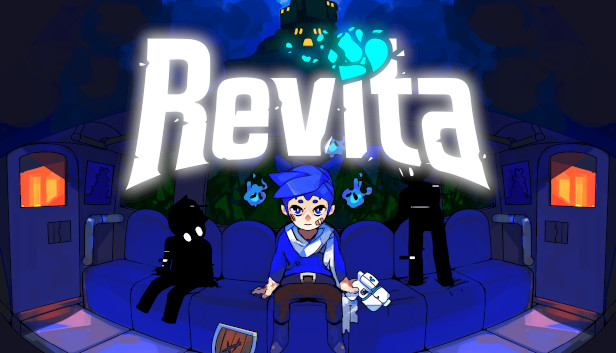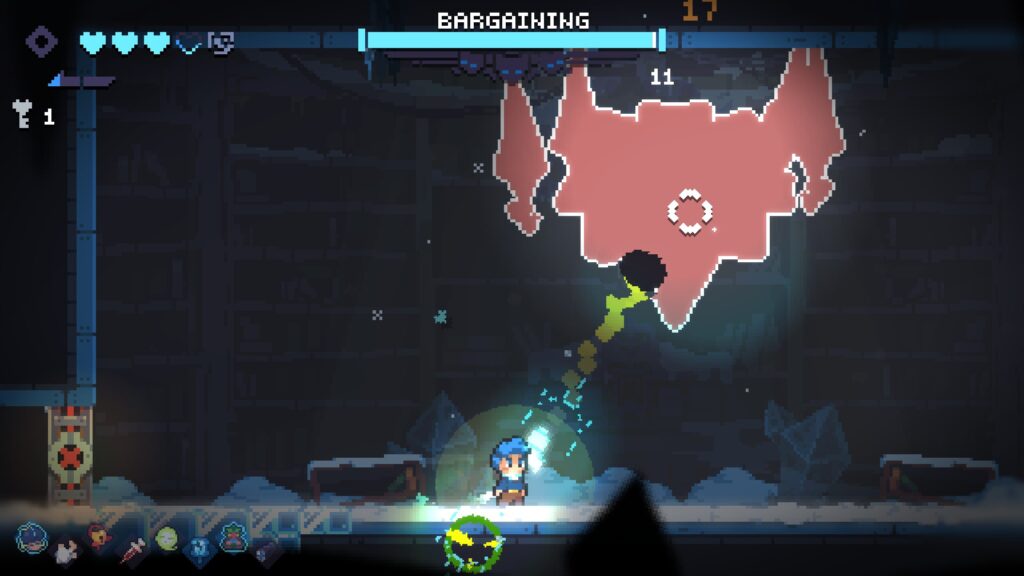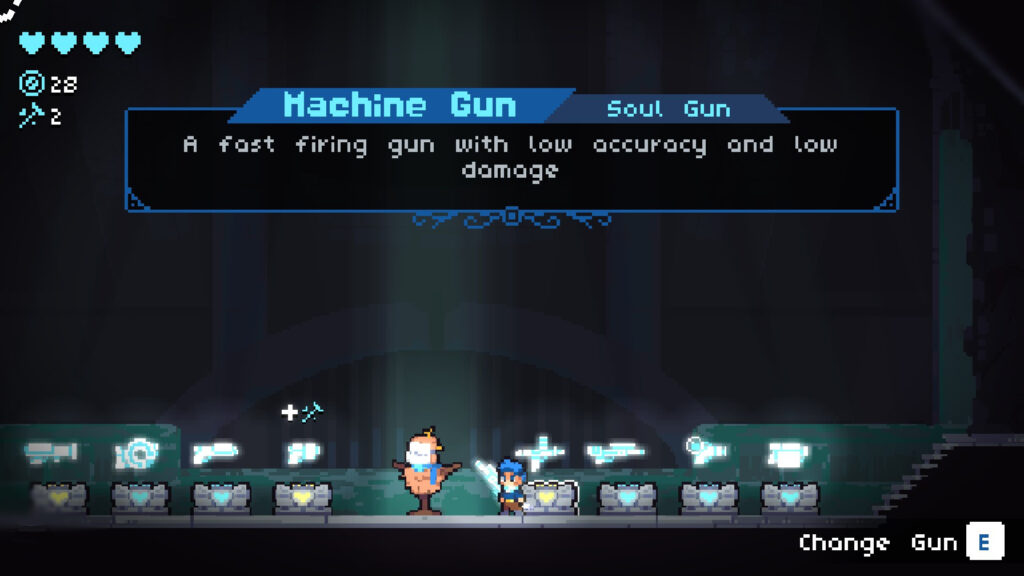
Developer: BenStar
Publisher: Dear Villagers, Doyoyo Games
Platform: PC, Switch
Tested on: PC
Revita – Review
Health is one of the most important resources in games, requiring players to pay close attention to it at risk of a game over. However, despite its importance, health rarely serves other purposes besides the most literal one we just described. A handful of games mess with abilities that consume some of it, but these tend to be uncommon and rarely a focus. Enter Revita, where the player’s life is the ‘be-all and end-all’, as it is required to open chests, shop and, of course, survive.
Story
As with most roguelikes, Revita’s story is not the focus, thus it is left as little more than a plot hook to get the game started with. It sees players arriving at a mysterious metro station, from which an ever-present clock tower can be seen, to whom the player is inexplicably attracted. However, as players progress by beating the game over and over, small snippets of lore will unlock for the protagonist, actually giving the narrative some depth. Besides this, there is little more to mention, with NPCs that just flesh out the station and the world by adding some character, although their interactions are short and to the point.
Graphics
The game’s graphics are made up of detailed pixelart sprites with a moody palette of cold colors, hammering in the mood the game is aiming for. As expected from the genre, Revita features a slew of different creatures for players to beat, spread throughout a plethora of different levels with unique themes. These go from forests to underwater temples, with the monsters in each matching the theme besides a few common monsters that are spread throughout.
Sound
Revita’s sound design features a stellar soundtrack and good SFX which are only bogged down by the repetition. As good as the tracks themselves might be, after visiting the same handful of areas over and over, they soon become stale. However, this doesn’t in any way reduce their quality, it only highlights the fact that alternative themes would perhaps be welcome.
Gameplay
Revita is part of the roguelike genre, meaning it sees its players embark on short runs where they’ll progress through a set of five areas with randomized enemies and items from a set pool. Between each run, they’ll also be able to increase the item pool and add new things to find in subsequent attempts. This novelty particularly ramps up after the player’s first and fourth victories, after which new possibilities will open up (although they won’t be explained to prevent spoilers).
Throughout each run, players will have a consistent set of resources and abilities. The main resources players will have to account for are keys to open locked doors, “soul” for their healing ability, and last but most important, health. As previously explained, health also doubles as money in Revita, making it even more important than usual. During their runs, players will consistently find locked chests and shops which will require health for their contents, as well as sacrifice shrines that provide a selection of items depending on the amount of health spent. Besides this, players will also have access to a dash that provides invincibility for its duration and the ability to heal, which consumes a bar of the aforementioned soul resource per half heart. Additionally, this healing ability provides another layer of depth by allowing players to gain max health by further healing when maxed out. However, instead of half a heart per soul bar, players will only gain a quarter, requiring four uses per new point of max health.
The items players will obtain during runs have different and unique effects, such as flat stats, companions, or ability modifiers. These items or “relics” are also divided into several rarity tiers, with Legendary being the highest and usually the most powerful. Besides continuously obtaining new relics via the shop, chests, or altars, players will also be able to improve their owned ones. This can be done during the intermission after each area, where they’ll be able to sacrifice max health to grant the selected item a more powerful effect.
While players will always be locked to a single weapon during runs, changing their loadout is also possible in between attempts. By spending some resources obtained by defeating bosses, players will be able to unlock a handful of new guns with unique effects, including a rocket launcher or a wind-up gun. Each of these also has its own unique stats, somewhat altering the basic strategies and item synergies.
One of the other main gimmicks the game features are its secrets, which can be found by interacting with certain things in the environment. These include things such as unique items, alternate areas, and hidden lore. However, most are not available until the previously mentioned fourth win, which the game doesn’t make particularly clear, possibly sending players on a wild goose chase before that.
Other than that, the only possible issue the game features is repetition, mostly due to limited item and enemy pools. Runs tend to feel relatively samey, due to how items providing flat stats or smaller bonuses are the norm, making them blend in with each other. This is even more egregious with the enemies, since players will always see the same handful in the same areas, with little variation. The small size of the rooms where players will fight doesn’t particularly help this, making them even less prone to be memorable or unique.
Conclusion
Revita is an entertaining roguelike with a unique mechanic in the way how it utilizes health as a currency. Players with previous experience in the genre will most likely not be blown away by what it has to offer, although it certainly is more than enough to provide you with a good time. Besides this, it is worth mentioning the mechanical level isn’t as deep as other games in the genre such as Enter the Gungeon or The Binding of Isaac, although this might change over time. At a price of €/$16.99/£13.49, the game is fairly priced for the content it offers, although perhaps waiting for further updates or a sale would be recommendable.
Personal Opinion
“While I’ve enjoyed my time with Revita, I was somewhat let down by the speed at which the game starts. At normal speed, the game felt sluggish while moving and especially when shooting. Luckily, the accessibility options included the ability to increase the game speed, which I promptly cranked up to 200% and then lowered to 150%, because the difference was simply jarring. That’s not meant to be a criticism, just an anecdote, but the game does feel much better now that it’s faster. Curiously enough, after this speed increase some weapons feel weaker, due to their faster shots being less noticeable. Another gripe I had with the game besides its initial slowness was the “possible wild goose chase” mentioned in the review. Mild spoilers here, after the first win, players will be told they need something to actually leave the station, being prompted to explore more. This unlocks the alternate areas for the second and fourth stages, but not the other secrets required for proper progression. After this, I was left stumped for a good while, throwing run after run thinking I was missing something to open blocked paths. While obviously most players will just beat their runs, those with a mindset similar to mine will probably find this little misdirection rather annoying.”
1 Comment
Leave a Reply
You must be logged in to post a comment.










[…] to games like Revita, Chenso Club’s shop utilizes a somewhat unique currency: the player’s health. By spending life […]